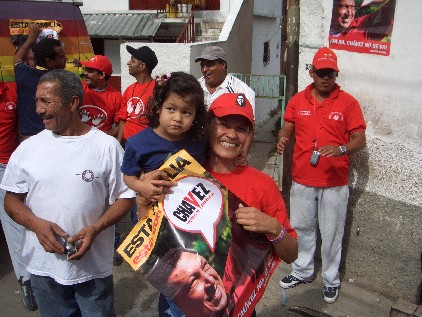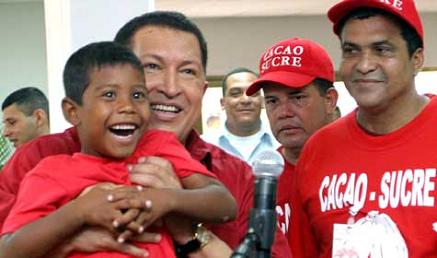|
|
|
Celebrating Chavez' landslide victory in 2006 - Axis of Logic photo |
Another clear victory scored by President Hugo Chávez in the regional and municipal elections past November 23. His political formation, the United Socialist Party of Venezuela (Partido Socialista Unido de Venezuela (PSUV)), emerged victorious in 233 municipalities (80%) and in 17 states (70%). In terms of the number of votes, he obtained 53,45% compared to 41,65% of the votes cast for the diverse opposition candidates. Furthermore, the latter (opposition) lost 555,442 votes compared to the December 2007 referendum whereas the PSUV wins 694,342.
Since his election ten years ago, Hugo Chávez set about an ample transformation of Venezuela. His main objective consisted in improving the living standards of 70% of the population who lived below the Poverty Line. On the occasion of this tenth anniversary, we offer a first record of the main reforms.
Hugo Chávez is a President who is held in high esteem by his people. In a survey conducted in September 2008 he obtained 69% of favorable opinions. Chávez is also the President who can credit himself for having the strongest democratic legitimacy on the continent. In fact, he won ample victories in three successive presidential elections in 1998, 2000 and 2006 with more than 60% of the vote, and in a recall referendum in 2004 with 59,1% of the votes cast. The most eminent international institutions welcomed the transparency of the electoral processes. The only shadow in this picture: the defeat of the constitutional reforms in the referendum of December 2007 that ended twelve consecutive electorate victories obtained since 1998. (1)
The popularity of the Venezuelan leader becomes evident given the spectacular economic and social reforms that resulted in improvement of the living standards of the population. Nevertheless, things were not easy for Chávez. Being victim, in April 2002, of a coup d'état orchestrated by Washington, he was saved by an extraordinary popular mobilization. Later on, in 2003, he had to confront the sabotage of the petroleum infrastructure that cost the national economy $10,000 million, and he still continues to confront multiple destabilization attempts. (2)
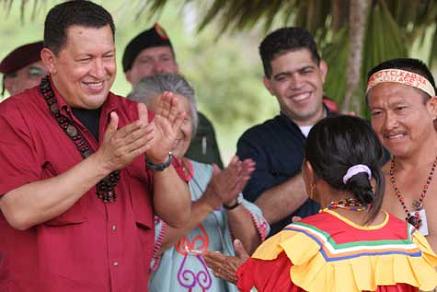 |
|
President Chavez meeting with indigenous from Amazonia |
Nationalizations
In 2003, the Bolivarian government managed to regain control of the state-owned oil company Petróleos de Venezuela S.A. (PDVSA), back then in the hands of the oligarchy, and the country's energy supplies, by nationalizing the hydrocarbons. PDVSA is now owner of at least 60% of the new mixed-companies. On the other hand, in May 2007, the Venezuelan government proceeded with the nationalization of the Orinoco oil belt that is economically very lucrative and comprises the world's most significant oil reserves. (3)
Prior to that, the multinational oil companies were drilling for a barrel of oil at the production costs of $4 and sold it back to the Venezuelan state for $25 for its commercialization, thus making substantial profits. The new system allows the state to save $3,000 million for the production of 500,000 barrels per day through the oil concessions in the Orinoco oil belt. These nationalizations allow the country to have at its disposal currently additional revenues for more than 400,000 barrels of oil per day. (4)
The Venezuelan government also decided to increase the tax on profits from 34% to 50%, after confirming that various international companies resorted to tax evasion. A new tax of 33,3% on the drilling for crude oil was created that generates over $1,000 million in additional revenues for the nation, as well as a new tax of 0,1% on the export of crude oil. (5)
The government set about a process of nationalization of some electricity and telecommunications companies that were monopolies. The private companies “Compañía Anónima Nacional Teléfonos de Venezuela S.A.” (CANTV) and “Electricidad de Caracas” that depended to a large degree on US capital, became state-controlled. (6)
In the realm of agriculture, Chávez has recovered about 2 million hectares from the big landowners, i.e., 28,74% of the arable land out of 6,5 million hectares that need to be nationalized. The objective is to develop agriculture in order to attain nutritional sovereignty. 49% of the recovered land was distributed amongst the peasants, 40% assigned to strategic projects and 11% handed over to cooperatives. (7)
These reforms have had a beneficial effect on the Venezuelan economy that counts 19 consecutive trimesters of growth with an average growth rate of 11,2%. (8)
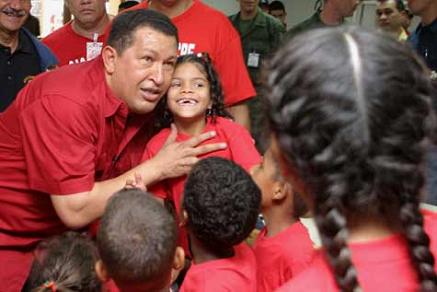 |
An authentic social revolution
The nationalization of diverse sectors of the economy, in conjunction with the increase in the price of petroleum, generated significant revenues for the state that set about an authentic social revolution. The government's policies have seen spectacular results thanks to the multiplying of the programs for the benefit of the poor.
Thanks to the creation of Fonden, (Fondo de Desarrollo Económico Nacional, Fund or National Economic Development) a special fund destined to finance the social programs, the percentage of people living below the Poverty Line dropped from 20,3% to 9,5% in ten years. Concerning unemployment, the percentage dropped from 16,6% in 1998 to 7,1% in 2008. The index of inequality between rich and poor decreased by 13,7% between 1998 and 2007. The number of social insurance pensioners increased by 218,4%. Public expenditures increased from 47,9% of the national budget in 1998 to 59,5% in 2007. (9)
The generalization of access to education, worked out in detail in 1998, has shown exceptional results. About 1,5 million Venezuelans learned to read thanks to the literacy campaign named "Mission Robinson I". In December 2005, the UNESCO declared the eradication of illiteracy in Venezuela. The Mission Robinson II was launched with the objective of giving the entire population to the completion of junior high school. Furthermore, there are the Missions Ribas and Sucre that give several tens of thousands of young people the opportunity to enroll in university studies for the first time in Venezuela. In 2007, Venezuela had almost 12,7 million children enrolled at school out of a population of 26 million inhabitants. The number of children enrolled at school has not ceased to rise since Chávez came to power. In 2001 it was 6,9 million; in 2002, 9,5 million and the number leveled off at 11,3 million in 2004. In 2005 there were 11,8 million children enrolled and 12,1 million in 2006. (10)
|
|
In the realm of health service, the public healthcare system was created with the objective to grant free access to Medicare for all Venezuelans. Mission Barrio Adentro I provided 300 million consultations in the 4,469 medical centers created since 1998. In 1998, less than 3 million people had regular access to medical care. About 17 million people have benefited from this program and more than 104,000 lives are estimated to have been saved. The infant mortality rate was reduced to less than 10 [deaths] per thousand [births]. On the other hand, thanks to the Operación Milagro (Mission Miracle) from Cuba, which consists in free eye surgery for poor Latin Americans who are suffering from eye diseases, 176,000 poor Venezuelans have regained their sight. (11)
To eliminate the problems of malnutrition, the government has launched the Mission Alimentación with the creation of food stores called Mercal, whose goods are subsidized by the state by 30%. Almost 14,000 retail outlets have been installed all over the country. Half of the population, i.e., more than 13 million people, purchase their food in these stores. In addition, more than 4 million children receive free, nutritionally selected foods through the School Food Program (Programa de Alimentación Escolar). In 1998, only 250,000 children benefited from this program. According to CEPAL, Venezuela now has the third lowest infant malnutrition rate of Latin America after Cuba and Chile. (12)
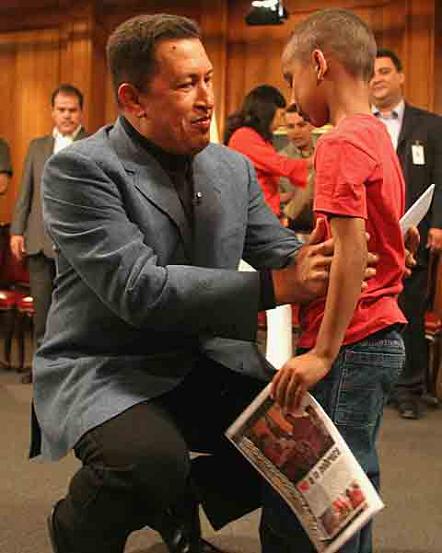 |
In 1998, 80% of the inhabitants in urban areas had access to drinking water. In 2007, the figure reached 92%, thanks to the enormous gains realized in this field. Notable efforts were also made in rural areas, [with the percentage of people having access to drinking water] rising from 55% in 1998 to 71% in 2007 in these rural areas. More than 6,5 million people benefited from these achievements by the government. In this area Venezuela has thus achieved since 2001 the Millennium Goals stipulated by the UNO for the year 2015. (13)
The monthly minimum wage has increased from $118 in 1998 to $154 in 2003 and $192 in 2005. At present it is $286, the highest on the Latin American continent. By comparison, during the IV Republic the minimum wage, at best, stagnated, and sometimes decreased. In 1996, when the inflation of the country reached an astronomical rate of 100%, the minimum wage amounted only to $36 a month, compared to $101 in 1994 and $132 in 1992. (14)
Furthermore, senior citizens who never had worked, now receive income aid that is equivalent to a 60% of the minimum wage. Defenseless women and physically challenged persons receive an economic aid that is equivalent to 80% of the minimum wage. Housewives over 61 receive a complete pension with priority being given to the poorest. Moreover, working hours will be reduced to 6 hours per day and 36 hours per week by 2010 without a decrease in salary. (15)
With regard to housing, the authorities have set about a political structure for great works with the massive construction of new lodgings destined for the popular layers of society and have initiated a politics of micro credits. Thanks to this social revolution, Venezuela is now part of the listing of the 70 countries with a high Human Development Index. (16)
International solidarity
Hugo Chávez, who opted out of the World Bank and the IMF by paying back Venezuela's debts in advance, has extended assistance to the other American nations by working out the Bolivarian Alternative for the Americas (Alternativa Bolivariana para las Américas, ALBA) and creating the Banco del Sur, (Bank of the South) destined to promote the economic integration of the region. At present, Venezuela offers a direct financial aid to the continent that is more significant than the amount granted by the United States. In 2007, Chávez dedicated more than $8,800 million in donations, financing and energy aid, compared to only $3,000 million on the part of the Bush administration. Incredibly, US citizens, abandoned by their own government, also benefited from Venezuela's altruistic policies by receiving subsidized heating oil. (17)
Venezuela is the evident proof that a government can rapidly contribute to a drastic reduction of poverty and noticeably improve the wellbeing of its population, under the condition that it has the necessary political will and commits a part of the national wealth to those who are the most deprived. Caracas constitutes the perfect example of change in Latin America where the peoples of various nations brought leaders to power who do represent the general interest, and who do have an authentic political will to end the inequalities that devastate the continent. At a time when an unprecedented financial crisis is devastating the global economy, Venezuela is the bearer of a convincing alternative to barbarous neoliberalism.
Notes
1. ABN, «Gestión presidencial tiene 69% de aceptación»; Presidential Discharge of Office Approved by 69%. October 6th, 2008; ABN, «Victoria Roja, Rojita»; Red, Deep Red Victory. December 3rd, 2006.
2. Salim Lamrani, «Soberanía petrolera, reformas sociales e independencia económica en Venezuela»; Petroleum Sovereignty, Social Reforms, and Economic Independence in Venezuela. Rebelión, May 15th, 2007.
3. Ibid.
4. Ibid.
5. Ibid.
6. Erika Hernández, «Cantv: icono de la privatización a la venezolana vuelve a manos del Estado»; Cantv: The icon of privatization à la Venezuela returns into the hands of the state. ABN, January 12th, 2007.
7. ABN, «Casi 2 millones de hectáreas han sido recuperadas del latifundismo»; Almost 2 million hectares retrieved from large estate holdings. March 25th, 2007.
8. ABN, «Venezuela entre los países con mayor índice de desarrollo Humano»; Venezuela amongst the countries with major Human Development Index. October 6th, 2008.
9. Ibid.
10. Ibid.; Salim Lamrani, «La revolución social del presidente Hugo Chávez»; The social revolution of President Hugo Chávez. Rebelión, May 9th, 2006.
11. Ibid.
12. ABN, «Venezuela entre los países con mayor índice de desarrollo Humano»; Venezuela amongst the countries with major Human Development Index, op. cit.; Salim Lamrani, «La revolución social del presidente Hugo Chávez»; The social revolution of President Hugo Chávez, op. cit.
13. ABN, «Venezuela sanea las cuencas de sus ríos para reducir escasez de agua»; Venezuela cleans up its river basins to reduce scarcity of Water. March 21st, 2007; ABN, «Venezuela entre los países con mayor índice de desarrollo Humano»; Venezuela amongst the countries with major Human Development Index, op. cit.
14. ABN, «Venezuela con el salario mínimo más alto de Latinoamérica»; Venezuela has Latin America's highest minimum salary. April 20th, 2007.
15. Ibid.
16. ABN, «Venezuela entre los países con mayor índice de desarrollo Humano»; Venezuela amongst the countries with major Human Development Index, op. cit. 17 Salim Lamrani, «Soberanía petrolera, reformas sociales e independencia económica en Venezuela»; Petroleum Sovereignty, Social Reforms, and Economic independence in Venezuela, op. cit.; Natalie Obiko Pearson & Ian James, «Exclusiva AP: Venezuela ofrece miles de millones a Latinoamérica»; AP Exclusive: Venezuela offers thousands of millions to Latin America. The Associated Press, August 26th, 2007; The Associated Press, «Ayuda venezolana a Latinoamérica y el Caribe en el 2007»; Venezuelan aid to Latin America and the Caribbean in 2007. August 26th, 2007.
© Copyright 2009 by AxisofLogic.com (translation)
This material is available for republication as long as reprints include verbatim copy of the article its entirety, respecting its integrity. Reprints must cite the author and Axis of Logic as the original source including a "live link" to the article. Thank you!
Original Source in Spanish: La nueva Venezuela del presidente Hugo Chávez. Diez años de Revolución Bolivariana; published on January 19, 2009.
Salim Lamrani is temporary lecturer at Paris Descartes University and French journalist, specialist on relations between Cuba and the US. He has just published Doble Moral. Cuba, la Unión Europea y los derechos humanos; Double Standards. Cuba, the European Union and Human Rights. (Hondarribia: Editorial Hiru, 2008).
This article has been translated from Spanish into English by Iris Buehler and revised by Les Blough, who are members of Tlaxcala, the network of translators for linguistic diversity.
